French Silver Altar Chalice in Traveling Case, Early 20th Century
You must be a subscriber, and be logged in to view price and dealer details.
Subscribe Now to view actual auction price for this item
When you subscribe, you have the option of setting the currency in which to display prices to $Au, $US, $NZ or Stg.
- Chalice - A chalice is a large cup or goblet that is used in religious ceremonies, particularly in Christian liturgical traditions. It is typically made of precious metal such as gold or silver, and is used to hold wine during the Eucharist, which is the central sacrament of the Christian Church. The chalice is also called the "cup of salvation" and is a symbol of Jesus' sacrifice on the cross.
In the Christian tradition, the chalice is a symbol of the blood of Jesus Christ, which is offered to the faithful as a means of grace and salvation. The chalice is used to hold the wine that is consecrated during the Eucharist and is considered to be a sacred object.
In the liturgical celebration of the Eucharist, it's passed around to the faithful, and the believer drinks from it to partake in the sacrament. Chalices are also used in other liturgical celebrations such as baptism, confirmation and anointing of the sick.
Chalices come in different shapes and sizes, from simple cups to highly ornate and decorative vessels, some of them are adorned with precious stones and intricate engravings. Chalices can also be used for other purposes, such as for holding holy water for baptism, or for the distribution of ashes on Ash Wednesday. - Embossed / Repousse - Embossing, also known as repousse, is the technique of decorating metal with raised designs, by pressing or beating out the design from the reverse side of the object.It is the opposite of chasing, where the decoration is applied from the front. An embossed or repoussed object may have chasing applied to finish off the design.
This item has been included into following indexes:
Visually similar items

An Australian silver parcel-gilt chalice, with cup-shape bowl, knopped column and trumpet foot, the bowl and foot engraved with a crown of thorns; W.J. Sanders & Co., Sydney. Height 19.5 cm. Wt approx 520g

A George III silver goblet, plain ovoid bowl raised on a circular spreading foot from a square plinth base. Monogrammed 'JEC'. London 1793 by Robert Hennell I. 225gms. Height 15.5 cm

A Victorian silver-plate trophy of goblet form, engraved, on beaded foot. Height 15.2 cm.

Antique oil banquet lamp with brass base converted to electricity, 68 cm high
